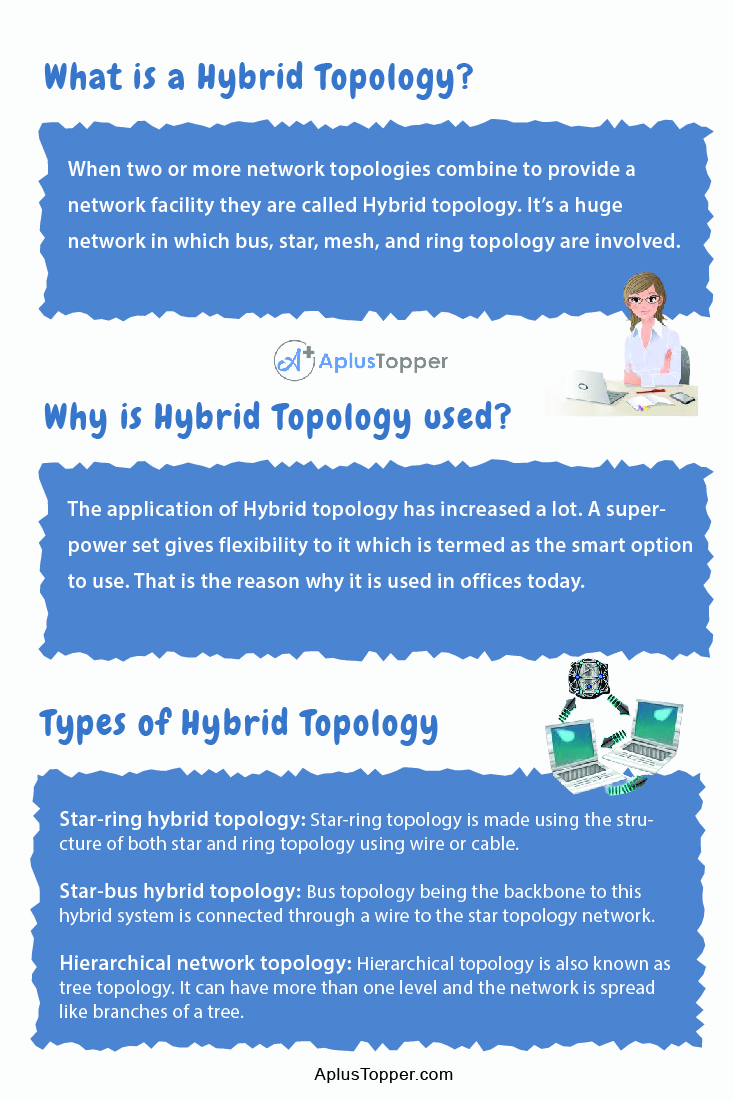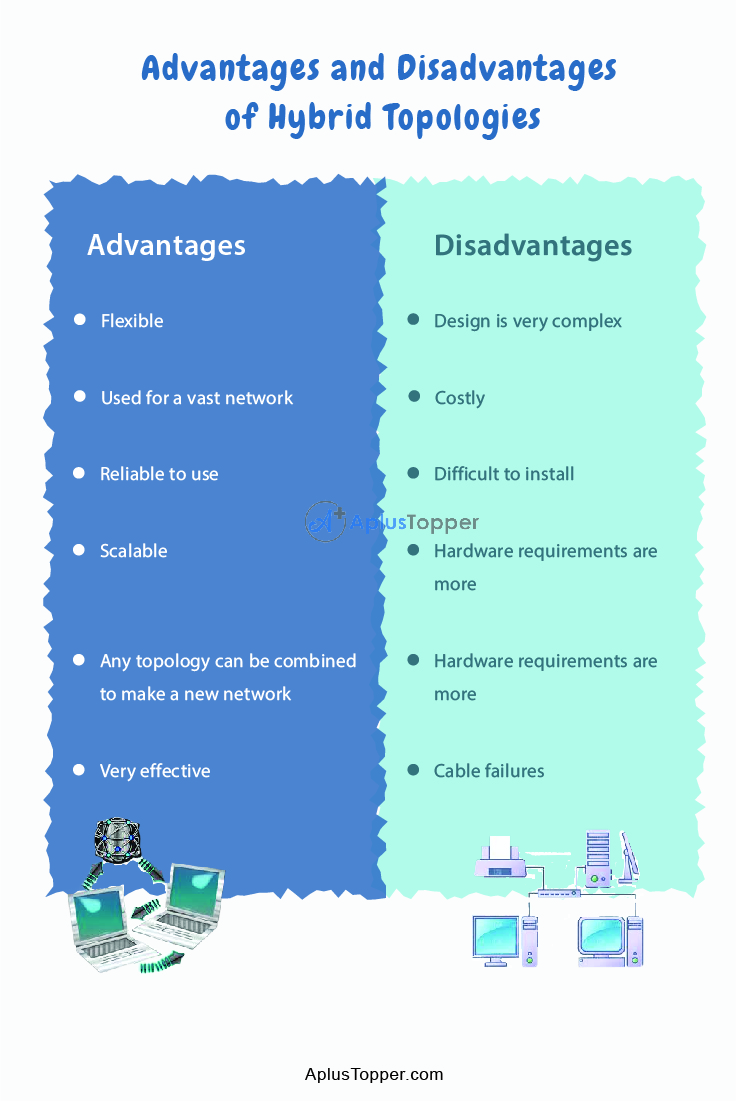Advantages and Disadvantages Of Hybrid Topology | What is Hybrid Topology?, Types, Why Hybrid Topology is Used?
Hybrid topology Advantages and Disadvantages: Topology refers to the structure of a computer network. When a computer is connected with another computer to establish a connection with the help of elements like nodes, links, etc. then it is referred to as network topology. Network topology is of two types namely physical topology and logical topology. There are various types of physical topology like bus topology, star topology, ring topology, mesh topology, and hybrid topology. We are going to look upon hybrid topology, its advantages, and disadvantages.
Students can also find more Advantages and Disadvantages articles on events, persons, sports, technology, and many more.
What is a Hybrid Topology? Advantages and Disadvantages Of Hybrid Topology 2022
When two or more network topologies combine to provide a network facility they are called Hybrid topology. It’s a huge network in which bus, star, mesh, and ring topology are involved. For example, if bus and ring topology are combined to make a huge network then this type of network is called Hybrid topology. Hybrid topology is mostly used in schools, organizations, consumers, or businesses according to their requirements. It is a very complex and flexible network system. A network is developed only when many network nodes are added to it, this is possible only through a hybrid topology which also allows changes in the levels of basic network levels.
- Why is Hybrid Topology used?
- Types of Hybrid Topology
- Advantages of Hybrid Topology
- Disadvantages of Hybrid Topology
- Comparison Table for Advantages and Disadvantages of Hybrid Topologies
- FAQs on Pros and Cons of Hybrid Technology
Why is Hybrid Topology used?
The application of Hybrid topology has increased a lot. A superpower set gives flexibility to it which is termed as the smart option to use. That is the reason why it is used in offices today. Normal basic topologies set up, if broken, leads to great loss but in hybrid topology, this becomes easy as it is designed to reduce the pros and cons of different topologies.
Types of Hybrid Topology
There are mainly three types of Hybrid Topology. They are:
- Star-ring hybrid topology: Star-ring topology is made using the structure of both star and ring topology using wire or cable.
- Star-bus hybrid topology: Bus topology being the backbone to this hybrid system is connected through a wire to the star topology network.
- Hierarchical network topology: Hierarchical topology is also known as tree topology. It can have more than one level and the network is spread like branches of a tree.
Now let us see the advantages and disadvantages of Hybrid topology.
Advantages of Hybrid Topology
Listed are a few advantages of Hybrid topology. Now let’s briefly discuss the advantages:
- Flexible: Hybrid Topology is the most flexible network topology as it can be changed and assembled using different structures of topology. So if any institution wants to have star-bus hybrid topology or star-ring topology they can choose any of them according to their requirements.
- Used for a vast network: Hybrid topology was introduced to overcome the shortcoming of other topologies i.e. they were not able to fulfill the need for a vast network connection. If one node fails then the whole topology is affected. Thus hybrid topology provides network connection over a large area.
- Reliable to use: Hybrid topology is a reliable and trustworthy network connection structure as even when one node fails to work it doesn’t shut down the whole system; we only need to change the node and then the process will remain the same. As another node will ensure the impact of malfunctioning would not affect others.
- Any topology can be combined to make a new network: There is no fixed combination of topology networks to be used in hybrid topology. A person or institute according to their requirement can use any topology network to make a new network.
- Scalable: Hybrid topologies structure is scalable as if any user wants to add any network or hardware component then it can be easily done without any disturbances in the network. This hybrid topology is thus desired by many in networking fields.
- Very effective: This topology is highly effective as users can use different topologies according to their needs. And the strength of the topologies makes this topology beneficial for users.
Disadvantages of Hybrid Topology
Listed are a few disadvantages of Hybrid topology
- Design is very complex: Making a hybrid network takes lots of effort from the network technicians of topologies as the design of networks is very complex. Network processing also becomes very complex due to the complex structure of topology.
- Costly: Hybrid topology requires a huge amount of resources and capital to build up a network. These resources are costly and delicate to use. Once damaged it must be bought back again to establish a better network thus making it costlier than others.
- Difficult to install: Installation of such a vast and complex network is a very difficult task. The cable network, as well as nodes, must be set systematically. The workers must be skilled to install such a huge network connection structure.
- Hardware requirements are more: The hardware used in the hybrid topologies is more in number. The nodes cable and structure of the topology make it difficult to install and multiple nodes require multiple cables for establishing a connection.
- Cable failures: Sometimes due to cable failure of the main backbone cable the other connected topologies that function with its help affect the entire network.

Comparison Table for Advantages and Disadvantages of Hybrid Topologies
| Advantages of Hybrid Topology | Disadvantages of Hybrid Topology |
| Flexible | Design is very complex |
| Used for a vast network | Costly |
| Reliable to use | Difficult to install |
| Any topology can be combined to make a new network | Hardware requirements are more |
| Scalable and very effective | Cable failures |

FAQs on Pros and Cons of Hybrid Technology
Question 1.
What do you mean by Topology?
Answer:
Topology refers to the structure of the network connection or network.
Question 2.
What is the main disadvantage of Ring topology?
Answer:
Ring topology has the main disadvantage that if one node will fail to work the whole network connection will break down.
Question 3.
What is Hybrid Topology?
Answer:
Hybrid topology is the combination of other topologies like a star, ring, bus, etc to set a network connection.
The post Advantages and Disadvantages Of Hybrid Topology | What is Hybrid Topology?, Types, Why Hybrid Topology is Used? appeared first on A Plus Topper.
from A Plus Topper
via Learning Made Simple 360
*Note that these contents are Autoblogged from A Plus Topper and cannot be edited.
Join the conversation